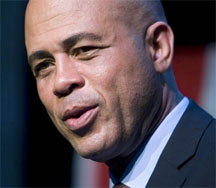PORT-AU-PRINCE, (Reuters) – Michel Martelly, a shaven-headed singer and political outsider, won Haiti’s presidential election in a landslide victory that tapped into deep popular desire for change in the poor, earthquake-battered Caribbean state.
Preliminary results announced by the Provisional Electoral Council on Monday gave the 50-year-old entertainer a clear win with nearly 68 percent of the vote, compared with just under 32 percent for his rival, former first lady Mirlande Manigat.
Celebrations erupted in the scruffy capital Port-au-Prince as cheering, jubilant Martelly supporters flooded the streets, singing, waving his portrait and setting off fireworks.

Martelly thanked voters in a brief statement on his Twitter account: “We’ll work for all Haitians. Together we can do it.”
Tense anticipation tinged with fears of violence had led up to the announcement of the results from the March 20 run-off, the first second-round presidential vote ever held in the politically volatile nation, one of the world’s poorest.
“Sweet Micky” Martelly, an iconoclastic entertainer known for his sometimes provocative stage acts, had campaigned on a forceful promise to change the status quo, pledging to break with decades of past corruption and misrule and bring a better life to Haitians struggling to recover from a devastating 2010 earthquake.
“Martelly’s victory implies a rejection of the political class that has both governed and been in the opposition,” said Robert Fatton, Jr., a Haiti expert and professor in the University of Virginia’s Department of Politics.
“Martelly captured the mood of the voters by cleverly using his ‘bad boy’ image to enhance his status as the ultimate ‘outsider’ who symbolized change,” he told Reuters.
Martelly, a star of Haiti’s Konpa carnival music whose onstage antics include wearing wigs and diapers and dropping his trousers, has no previous government experience.
As president, Martelly will face the huge challenge of trying to rebuild a small Caribbean country prostrated in poverty long before an earthquake killed more than 300,000 people and bludgeoned its fragile economy last year. Hundreds of thousands of destitute earthquake victims are still living in squalid tent and tarpaulin camps.
The results are preliminary because they can be subjected to legal challenges which must be dealt with by the electoral council before it can declare them definitive later in April.
‘LITTLE ROOM TO
MANEUVER’
To prevent trouble before and after the results were announced, blue-helmeted U.N. peacekeepers were out patrolling Port-au-Prince and other potential flashpoints. Some stores boarded up windows in anticipation of trouble.





